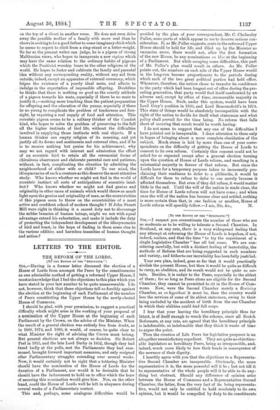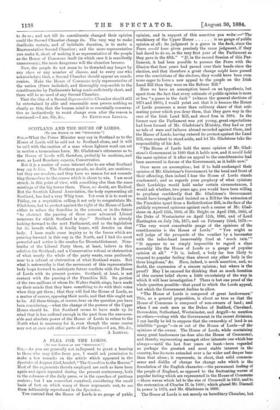[To TER EDITOR OF THE "SPECTATOR.")
Sin,—I suspect you overestimate the number of those who are so moderate as to be willing to tolerate a Second Chamber. In Scotland, at any rate, there is a very widespread feeling that any attempt at reforming the House of Lords is hopeless, if not, indeed, useless, and that the time " to try the experiment of a single Legislative Chamber " has all but come. We are con- sidering carefully, but with a distinct feeling of incredulity, the methods of Reform that are being suggested in such numbers and variety, and hitherto our incredulity has been fully justified.
Your own plan, indeed, goes so far that it would practically abolish the present House, but then it would be quite as difficult to carry, as abolition, and its result would not be quite so cer- tain. Besides, it is unfair to the Peers, especially to the ablest of them ; for so long as Peers alone are eligible for the Second Chamber, they cannot be permitted to sit in the House of Com- mons. Now, were the Second Chamber merely a Revising Chamber, as ex hypothesi it must be, then the country would lose the services of some of its ablest statesmen, owing to their being excluded by the accident of birth from the one Chamber in which their abilities could find full scope.
I fear that your leaving the hereditary principle thus far intact, is of itself enough to wreck the scheme, since all Scotch Reformers, at any rate, are agreed that the hereditary principle is indefensible, so indefensible that they think it waste of time to argue the point.
Then the creation of Life Peers for legislative purposes is an altogether unsatisfactory expedient. They are quite as objection- able legislators as hereditary Peers, being as irresponsible, and, indeed, much more likely to lose their heads in consequence of the newness of their dignity.
I heartily agree with you that the objections to a Representa- tive Second Chamber are insuperable. Obviously, the more representative it is, the more powerful will it be ; but not till it be representative of the whole people will it be able to do any- thing but obstruct. Should any difference of opinion arise between the House of Commons and a Representative Second Chamber, the latter, from the very fact of its being representa- tive, would not only be entitled to hold resolutely to its own opinion, but it would be compelled by duty to its constituents
to do so ; and not till its constituents changed their opinion could the Second Chamber change its. The very way to make deadlocks certain, and of indefinite duration, is to make a Representative Second Chamber ; and the more representative you make it, short of making it as representative of the people as the House of Commons itself (in which case it is manifestly unnecessary), the more dangerous will the situation become.
Now, the people do not mean to be thwarted any longer by any class or any number of classes, and to every one who acknowledges that, a Second Chamber should appear an anach- ronism. Make the House of Commons truly representative of the nation (Peers included), and thoroughly responsible to the constituencies by Parliaments being made sufficiently short, and there will be no need of any Second Chamber.
That the idea of a Second Representative Chamber should still he entertained by able and reasonable men proves nothing so clearly as this, that the human mind is so essentially conserva- tive as instinctively to resist change even after the reason is



































 Previous page
Previous page